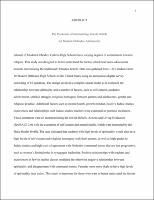Please use this identifier to cite or link to this item:
https://hdl.handle.net/20.500.12202/5799| Title: | The Predictors of Internalizing Jewish Beliefs for Modern Orthodox Adolescents |
| Authors: | Pelcovitz, David Turetsky, Ilana Goldberg, Scott Weinstein, Sharon Elsant |
| Keywords: | doctoral dissertation Jewish beliefs Modern Orthodox adolescents |
| Issue Date: | May-2020 |
| Citation: | Weinstein, Sharon Elsant. (2020) The Predictors of Internalizing Jewish Beliefs for Modern Orthodox Adolescents. [Unpublished doctoral dissertation, Yeshiva University] |
| Abstract: | Alumni of Modern Orthodox Yeshiva High Schools have varying degrees of commitment towards religion. This study was designed to better understand the factors which lead some adolescents towards internalizing the traditional Orthodox beliefs. Data was gathered from 1,341 students from 18 Modern Orthodox High Schools in the United States using an anonymous digital survey consisting of 83 questions. The design involved a complex causal model as it evaluated the relationship between spirituality and a number of factors, such as self-esteem, academic achievement, spiritual struggle, religious homogeny between parents and adolescents, gender and religious practice. Additional factors such as mental health, growth mindset, positive Judaic studies experiences and relationships with Judaic studies teachers were examined as potential mediators. These constructs were all measured using the Jewish Beliefs, Actions and Living Evaluation (JewBALE 2.0) with the exception of self-esteem and mental health, which were measured by the Duke Health Profile. The data indicated that students with high levels of spirituality would also have high levels of self-esteem and religious homogeny with their parents, as well as high grades in Judaic studies and high level of agreement with Orthodox communal norms that are less progressive, such as women’s limited roles in synagogue leadership. Positive relationships with teachers and experiences in Jewish studies classes mediated the otherwise negative relationship between spirituality and disagreement with communal norms. Females were more likely to have high levels of spirituality than males. This study is important for those who want to better understand the factors involved in helping students enrolled in Modern Orthodox High Schools achieve high levels of spirituality. |
| Description: | Doctoral dissertation, Ed.D., Azrieli Graduate School of Jewish Education and Administration. -- Open Access |
| URI: | https://hdl.handle.net/20.500.12202/5799 |
| Appears in Collections: | Azrieli Graduate School of Jewish Education & Administration: Doctoral Dissertations |
Files in This Item:
| File | Description | Size | Format | |
|---|---|---|---|---|
| S. Weinstein Dissertation.pdf | 768.32 kB | Adobe PDF |  View/Open |
This item is licensed under a Creative Commons License

